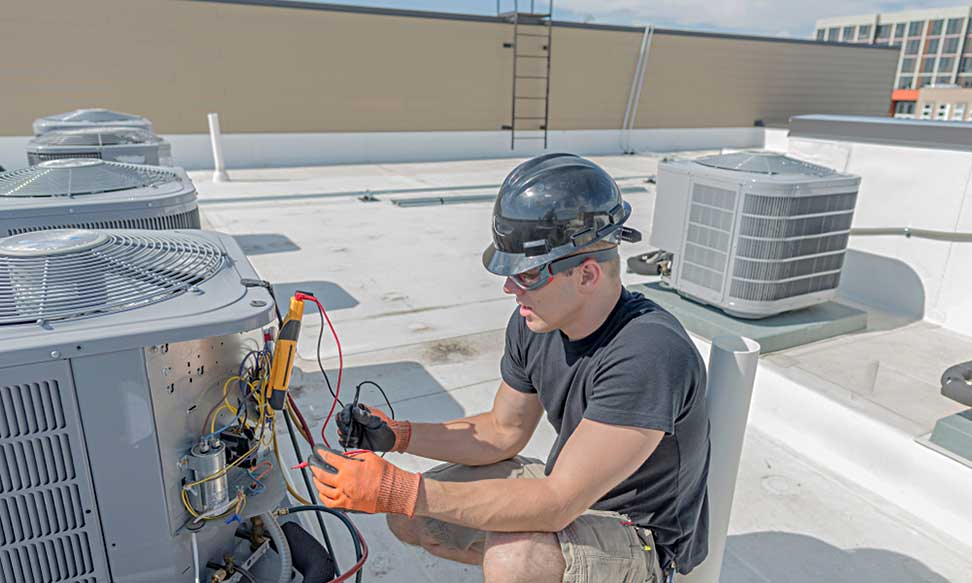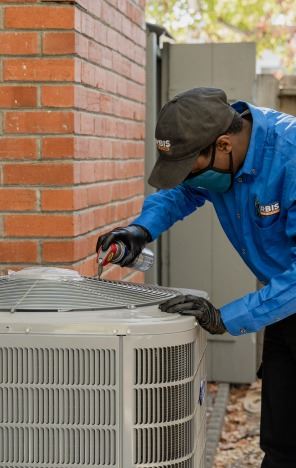Should You Choose ductless mini splits? Expert Opinions
Wiki Article
Selecting Between a Heatpump and Furnace: Secret Factors To Consider for Your A/c Demands
When evaluating heating choices for cooling and heating requires, the choice between a heatpump and a furnace can be complex. Each system uses unique benefits tailored to particular climates and energy effectiveness goals. Understanding these differences is necessary for making an educated option. Secret aspects such as installation costs and ecological effect better make complex the choice procedure. Which option genuinely aligns with one's convenience and sustainability preferences? The following areas will explore these considerations in detail.Comprehending Warmth Pumps: How They Function and Their Benefits
While many homeowners take into consideration numerous heating options, understanding how heatpump function and their advantages can significantly affect their choice. Heat pumps operate by transferring warm as opposed to producing it. In the winter months, they draw out heat from the outside air or ground and transfer it indoors, while in the summertime, they reverse this procedure, cooling down the home by getting rid of heat outside. This twin performance makes them versatile for year-round climate control.One of the key advantages of heat pumps is their power performance. They utilize significantly much less electricity contrasted to conventional furnace, potentially leading to lower utility expenses (furnace replacement). Furthermore, warmth pumps have a smaller carbon impact, making them an eco-friendly option. They likewise call for less upkeep than conventional systems, adding to long-term cost savings. In general, comprehending the mechanics and benefits of heatpump can help homeowners make notified decisions regarding their home heating and cooling needsDiscovering Heaters: Kinds, Operation, and Advantages
Heaters come in various types, including gas, electric, and oil models, each with distinctive functional devices. Understanding these differences is crucial, as they affect efficiency and home heating efficiency. Additionally, heating systems use numerous benefits, such as constant warmth result and integrity in colder environments.Types of Furnaces
Heater can vary significantly in design and procedure, with furnaces being a prominent selection among property owners. There are numerous types of heating systems, each using various gas sources and modern technologies. Gas heaters prevail, leveraging all-natural gas to create heat efficiently. Electric furnaces, on the various other hand, use electric resistance to generate heat, typically preferred for their uncomplicated installation. Oil heating systems, while less usual, are effective in locations with limited gas accessibility (heat pump replacement ooltewah tn). Furthermore, condensing heaters make the most of power performance by recording and reusing exhaust gases. Each kind operates via a system of warmth exchangers and ductwork to disperse warm air throughout a home. Recognizing the distinctions between these heater kinds is essential for informed heating and cooling choicesAdvantages of Furnaces
For homeowners seeking trusted heat throughout cool months, the benefits of heaters are significant. Furnaces give consistent heating, guaranteeing also temperatures throughout the home. They are specifically effective in extreme cool, typically outmatching warmth pumps in cold problems. Various types, including gas, electric, and oil heating systems, supply adaptability to satisfy varied demands and preferences.Furnaces additionally have a tendency to have reduced preliminary installment costs contrasted to heatpump, making them an extra easily accessible choice for several. Their durable layout adds to a longer life-span, with numerous devices lasting over 15 years with appropriate upkeep. Additionally, contemporary heating systems are frequently equipped with sophisticated innovation for boosted efficiency, which can bring about lowered energy expenses. Overall, heaters remain a reliable option for efficient home heating.
Power Effectiveness: Contrasting Warmth Pumps and Furnaces
When contrasting energy performance in between warm pumps and heating systems, the Seasonal Power Efficiency Ratio (SEER) plays an essential role in establishing efficiency. In addition, a functional price analysis discloses the long-term monetary effects of each system. Understanding these elements can guide homeowners in making informed decisions about their heating options.Seasonal Energy Effectiveness Proportion
Energy efficiency plays a vital duty in the decision-making process between heatpump and heaters, specifically when thinking about the Seasonal Power Efficiency Proportion (SEER) This metric actions the cooling performance of heat pumps over a whole air conditioning period, offering a standard way to evaluate performance. Greater SEER scores suggest higher power effectiveness, converting to lower energy consumption and minimized utility expenses. In contrast, heaters are generally evaluated making use of the Annual Gas Use Efficiency (AFUE) score, which shows heating effectiveness. When comparing these two systems, homeowners should focus on SEER ratings for warmth pumps, as they straight influence total energy cost savings and ecological sustainability. A comprehensive understanding of SEER can especially influence the lasting contentment and cost-effectiveness of the picked cooling and heating option.Functional Cost Evaluation
Recognizing the operational expenses connected with heatpump and heaters is essential for homeowners examining their choices. Heatpump normally provide greater power effectiveness, converting electrical power right into heat with marginal waste. This causes lower monthly energy costs, particularly in modest environments. Alternatively, traditional heaters, particularly gas designs, may have reduced in advance costs yet can sustain greater functional expenses gradually because of sustain costs and effectiveness ratings.Moreover, heatpump can function as both heating and cooling systems, possibly decreasing the demand for separate cooling and heating systems. While initial investments for warm pumps may be greater, their long-lasting savings in power performance can make them an extra affordable option for many households. Careful analysis of neighborhood energy rates is important to establish the finest option.Setup Prices: What to Anticipate for each and every Home Heating System
Installation costs for heater can differ significantly in between heatpump and furnaces, affecting homeowners' choices. Heatpump generally have greater ahead of time installment prices, commonly ranging from $3,500 to $8,000, depending on the system dimension and complexity of installment. This consists of the exterior system, indoor handling system, and necessary ductwork alterations. Alternatively, furnaces often tend to have lower initial expenses, averaging in between $2,500 and $6,000, which can be appealing for budget-conscious home owners. Nonetheless, installation costs can boost if extensive ductwork is required.Moreover, the option of fuel kind for heating systems-- gas, lp, or electrical-- can likewise influence installation costs. While warmth pumps use energy efficiency, their preliminary investment might prevent some customers. Inevitably, examining setup prices alongside lasting financial savings and performance will assist homeowners in making notified choices regarding their heating unit.Climate Considerations: Which System Carries Out Much Better in Your Location
How do environment problems affect the efficiency of heater? The efficiency of heatpump and heaters can differ considerably depending upon the local climate. In moderate environments, heatpump stand out by effectively transferring warmth from the outdoors air, making them an energy-saving option. Their performance lessens in very cold temperature levels, where they may struggle to draw out enough warmth. Conversely, heating systems, specifically gas designs, offer trustworthy and consistent warmth despite outside problems, making them better in cooler regions.In areas that experience milder winters, heatpump can run successfully year-round, providing both heating and air conditioning. In comparison, regions with harsh winter seasons typically take advantage of the robustness of heaters. Eventually, comprehending the neighborhood environment is necessary when deciding between a warmth pump and a furnace, as it straight affects their functional efficiency and general performance.Maintenance Requirements: Long-Term Treatment for Warmth Pumps vs. Furnaces
While both heatpump and heaters need normal upkeep to assure peak performance, their specific needs and care routines vary significantly. Heating systems normally require much less constant attention, with yearly inspections sufficing to inspect for gas leaks, tidy filters, and evaluate overall performance. Their less complex design frequently enables straightforward repairs.In comparison, heatpump demand semiannual upkeep because of their dual function in heating & cooling. This includes cleaning coils, inspecting refrigerant degrees, and making sure that both the exterior and indoor devices work at their ideal. In addition, heat pump maintenance typically entails more detailed parts, making professional servicing essential.Neglecting maintenance can bring about diminished effectiveness and boosted power expenses for both systems. Inevitably, home owners must take into consideration these long-term this article care demands when selecting between a heatpump and a heating system, as positive maintenance can expand the life-span and performance of either system substantially.Ecological Influence: Picking a Sustainable Home Heating Choice
The environmental influence of heater is a vital analysis for home owners looking for sustainable options. Heatpump are usually a lot more energy-efficient than traditional heaters, as they move heat instead than generate it, considerably lowering carbon discharges. By making use of renewable resource resources, such as air-source or geothermal warm pumps, property owners can additionally lessen their environmental footprint.On the other hand, gas heaters send out greenhouse gases and add to air contamination, though they often offer greater warm output. However, developments in innovation have actually led to the growth of high-efficiency furnaces that decrease emissions.Ultimately, choosing a home heating system involves considering efficiency versus environmental impact. House owners are urged to mirror on regional energy sources and motivations for eco-friendly systems, ensuring a selection that aligns with both personal right here comfort and ecological obligation. The choice impacts not just instant convenience however additionally long-lasting sustainability and environmental wellness.Often Asked Inquiries
Exactly How Long Do Warm Pumps and Furnaces Commonly Last?
The life expectancy of warmth pumps generally varies from 15 to twenty years, while furnaces can last in between 15 to 30 years. Routine maintenance significantly affects their long life and performance in giving home heating options.Can I Use a Warmth Pump in Very Cold Climates?
Heat pumps can run in extremely chilly environments, however their effectiveness decreases as temperatures drop. In such problems, supplemental home heating resources may be necessary to maintain comfy interior temperatures and ensure peak efficiency.
What Is the Sound Level of Heat Pumps Versus Furnaces?
The sound levels of heat pumps and furnaces differ significantly. Usually, heatpump operate more silently than standard furnaces, making them better for those sensitive to seem, while heating systems may create louder functional sounds during home heating cycles.
Are Heat Pumps Suitable for Both Heating & Cooling?
Heatpump are indeed suitable for both heating & cooling (heat pump installation ooltewah tn). They function by moving warmth, supplying efficient temperature control year-round, making them a flexible option for home owners looking for an all-in-one cooling and heating remedyWhat Dimension Heater Do I Need for My Home?
Figuring out the appropriate dimension heater for a home requires examining variables such as square footage, insulation top quality, regional environment, and the home's design. Consulting an expert can guarantee an accurate analysis and suitable convenience. Warmth pumps commonly use greater power efficiency, transforming electrical energy right into warmth with minimal waste. In modest environments, warmth pumps stand out by successfully moving warmth from the outdoors air, making them an energy-saving option. On the other hand, heating systems, especially gas designs, offer constant and dependable warm no matter of outside conditions, making them more suitable in chillier regions.In locations that experience milder winters, warm pumps can run efficiently year-round, offering both heating and cooling. Warmth pumps are normally a lot more energy-efficient than typical heating systems, as they transfer warm instead than produce it, significantly decreasing carbon exhausts. By using eco-friendly power resources, such as air-source or geothermal heat pumps, homeowners can even more lessen their ecological footprint.On the other why not try these out hand, natural gas heating systems emit greenhouse gases and contribute to air pollution, though they frequently offer greater warmth output.Report this wiki page